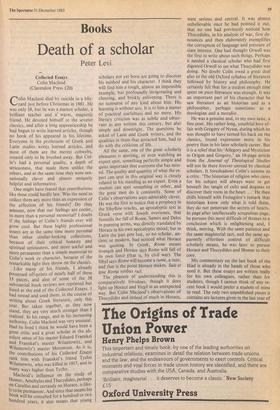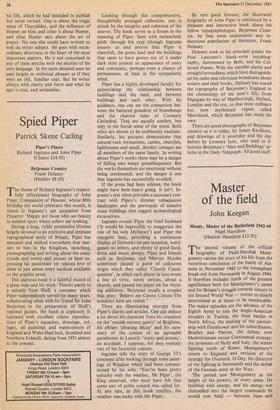Books
Death of a scholar
Peter Levi
Collected Essays Colin Macleod (Clarendon Press £20)
Colin Macleod died by suicide in a bliz- zard just before Christmas in 1981. He was only 38, but he was a mature scholar, a
brilliant teacher and a' warm, magnetic friend. He devoted himself to the severer classics, and after a long apprenticeship he had begun to write learned articles, though no book of his appeared in his lifetime.
Everyone in the profession of Greek and Latin studies writes learned articles, and most of them are the merest cobwebs, created only to be brushed away. But Col- in's had a personal quality, a depth of seriousness, that made them unlike the others, and at the same time they were sen- sationally clever and almost uniquely helpful and informative.
One might have feared that contributions like these could hardly last. Was the need to collect them any more than an expression of the affection of his friends? Do they amount, now that our feelings are cooler, to more than a personal memorial? I doubt if the feelings of Colin's friends ever will grow cool. But these highly professional essays are at the same time more personal than other similar-looking collections, because of their critical honesty and spiritual seriousness, and more useful and more permanent than a simple memorial to Colin's work or character, because of the remarkable light they throw on the classics.
Like many of his friends, I already possessed off-prints of nearly half of these 33 pieces, and also of some of the 38 substantial book reviews not reprinted but listed at the end of the Collected Essays. I had reread and used them, in the course of writing about Greek literature, only this Year. But taken together, as they now stand, they are very much stronger than I realised. In his range, and in his increasing authority, Colin Macleod was very unusual. Had he lived I think he would have been a great critic and a great scholar in the ab- solute sense of his master Eduard Fraenkel and Fraenkel's master Wilamowitz, and Wilamowitz's master Mommsen. As it is, the contributions of his Collected Essays rank him with Fraenkel's friend Tycho Wilamowitz, who was killed in 1917, and in many ways higher than Tycho.
Macleod's influence on the study of Homer, Aeschylus and Thucydides, perhaps on Catullus and certainly on Horace, is like- IY to be permanent. And since that means his book will be consulted for a hundred or two hundred years, it also means that young scholars not yet born are going to discover his method and his character. I think they will find him a tough, almost an impossible example, but profoundly invigorating and cheering, and briskly enlivening. There is no nonsense of any kind about him. His learning is without airs. It is to him a matter of practical usefulness and no more. His literary criticism was as subtle and obser- vant as any written this century, but also simple and downright. The questions he asked of Latin and Greek writers, and the qualities in them that attracted him, had to do with the criticism of life. '
All the same, one of the great scholarly pleasures is spotting, or even watching an expert spot, something perfectly simple and quite important that everyone else has miss- ed. The quality and quantity of what the ex- pert can spot in this original way is closely related to his standing as an expert. Even a student can spot something or other, and the great men do it constantly. Some of Colin's observations were admirably clever. He was the first to notice that a prophecy in the Sibylline oracles, an apocalyptic text in Greek verse with Jewish overtones, that foretells the fall of Rome, Samos and Delos in punning terms, was directly translated by Horace in his own apocalyptic mood; but in Latin the pun gets lost, so no scholar, an- cient or modern, had noticed what Horace was quoting. In Greek, Rome means strength and Horace says Rome will fall of its own force (that is, by civil war). The Sibyl says Rome will become a rume, a ruin; and that is the point Horace makes. Suis et ipso Roma viribus ruit. The pleasure of understanding this is comparatively frivolous, though it does light up Horace and Virgil in an unexpected way. But Colin Macleod's observations of Thucydides and indeed of much in Horace, were serious and central. It was almost unbelievable once he had pointed it out, that no one had previously noticed how Thucydides, in his analysis of war, first de- nounces and then elaborately exemplifies the corruption of language and pressure of state interest. One had thought Orwell was the first to write about such things. Perhaps it needed a classical scholar who had first digested Orwell to see what Thucydides was doing. No doubt Colin owed a great deal also to the old Oxford syllabus of literature followed by history and philosophy. He certainly felt that for a student enough time spent on pure literature was enough. It was an important part of his character that he saw literature as an historian and as a philosopher, perhaps sometimes as a theologian and a moralist.
He was a genuine and, to my own' taste, a fine poet. His rather long, youthful love af- fair with Gregory of Nyssa, during which he was thought to have turned his back on the classics, found expression more in his poetry than in his later scholarly career. But it is a relief that his 'Allegory and Mysticism in Origen and Gregory,' an 18-page article from the Journal of Theological Studies will not lie there forever unread by classical scholars. It foreshadows Colin's axioms as a critic. 'The historian of religion who cares for his subject will always want to get beneath the tangle of cults and dogmas to discover their roots in the heart...' He then chills himself with Festugiere's remark that historians know only what is told them, they do not penetrate the secrets of hearts. In page after intellectually scrupulous page, he pursues this most difficult of themes to a conclusion which is enlightening and, I think, moving. With the same patience and the same magisterial tact, and the same ap- parently effortless control of difficult scholarly means, he was later to pursue Horace and Thucydides and Homer to their core.
His commentary on the last book of the Iliad is already in the hands of those who need it. But these essays are written really for his own colleagues, rather than for students, though I cannot think of any re- cent book I would prefer a student of mine to read. The only two unpublished pieces it contains are lectures given in the last year of
his life, which he had intended to publish but never revised. One is about the tragic sense of Thucydides, and the influence of Homer on him; and other is about Homer, and what Homer says about the art of poetry. No one else could have written so well on either subject. He goes with extra- ordinary directness to the heart of the most important matters. He is not concerned in any of these articles with the niceties of his own language. In the most detailed ones he uses jargon or technical phrases as if they were an old, familiar coat. But he writes always with clarity and force and what he says is true, and unfamiliar.















































 Previous page
Previous page